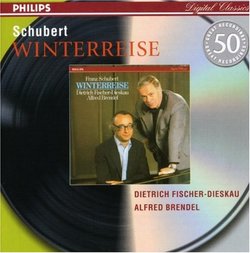| All Artists: Dietrich Fischer-Dieskau, Franz [Vienna] Schubert, Alfred Brendel Title: Schubert: Winterreise Members Wishing: 0 Total Copies: 0 Label: Philips Import Release Date: 12/18/2000 Album Type: Original recording remastered, Import Genres: Pop, Classical Styles: Vocal Pop, Chamber Music, Historical Periods, Classical (c.1770-1830) Number of Discs: 1 SwapaCD Credits: 1 UPC: 028946473924 |
Search - Dietrich Fischer-Dieskau, Franz [Vienna] Schubert, Alfred Brendel :: Schubert: Winterreise
 | Dietrich Fischer-Dieskau, Franz [Vienna] Schubert, Alfred Brendel Schubert: Winterreise Genres: Pop, Classical
|
Larger Image |
CD Details |
CD ReviewsAbsolutely Fantastic! Gideon Pisanty | Israel | 08/27/2002 (5 out of 5 stars) "A wonderful performance... Fischer-Dieskau is always the best, and Brendel here gives a beautiful accompaniement, strongly emphasizing the extra-musical features. I especially liked "Die Post", "Der Lindenbaum", "Trockne Blumen" (where one can really hear the leaves falling) and "Der Leiermann". The tragic atmosphere is fully conveyed. This is Brendel of the early eighties, one I prefer compared to today's Brendel, which tends to exaggerate his interpretation and sometimes sounds artificial, to my taste. Here Brendel gives us pure Schubert, with a Schubertian "natural" sound, and the total emotionality of the music, unexaggerated. The recording is also excellent." Revelatory, essential Leonardo | Argentina | 02/12/2006 (5 out of 5 stars) "I know only 3 releases by DFD of his (7) commercial cds available: 1966 (demus), 1972 (Moore) and 1985 (brendel). in this I can see an evolution: as time passes by his voice is less fresh and becomes more "histrionic". I think 1972 is better than 1966 because more emotional details are revealed in 1972. There are no passages without being highlighted in 1972 (as I find in 1966). If you want clear, fresh voice, go for 1966 (or perhaps earlier eg 1962 -Moore-?). In 1972, as in 1966, he is in great vocal form. Perhaps that is why Grammopone said 1972 is the central DFD reading of winterreise. What happens in 1985? To begin with, winterreise is a song essay about despair and solitude. An exalted approach is surely wellcome here. And that is what you get: DFD sounds more exalted, more involved than ever. At such an age ir is impressive to see in how good form he is in forte passages. At the same time, as he becomes wiser, time also passes by: he is not in good vocal form as in 1966 or 1972: some notes sound a bit ugly. But ONLY A FEW NOTES, which are overwhelmed by lots of moments which show DFD as most perceptive of emotional and musical nuances. Here he gives the whole of himself to the service of music. Perhaps also before, but here is much more evident given his (partially) decandent (compared with the sixties) vocal form. And if you still have doubts (better vocal form vs more profound, personal, emotional), brendel answers all of them. By far is the best pianist. Why? Because Demus and Moore sound like accompanist pianists. Moore, in particular, is like DFD's shadow. A complete partnership with the singer.In paper this is great but listen to brendel and you will see what Schubert really wrote for piano: not just music to support the voice but worthy of being considered as satisfactory independent music parts. In other words the piano writing benefits a lot by being interpreted by a soloist and not a mere accompanist. And brendel is more than just a soloist: he is also a researcher. His piano style blends modern practices with period ones, bringing forward more clarity than average. This is not a singer - and - his - shadow - show (DFD-Moore), but a meeting of two outstanding musical personalities. The most satisfactory winterreise of the 3 for me." Silver Standard csmith@laszczuk.pl | Warsaw, Poland | 10/01/2001 (4 out of 5 stars) "All here is smooth and correct. But the emotion seems "mailed-in," and emotion is so important for Schubert songs!
The piano work comes across more strongly and playfully than in some other recordings. My gold standard for this work remains Peter Pears and Benjamin Britten on London/Decca." |

 Track Listings (24) - Disc #1
Track Listings (24) - Disc #1